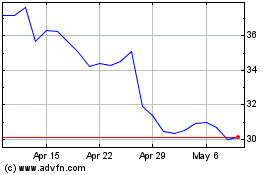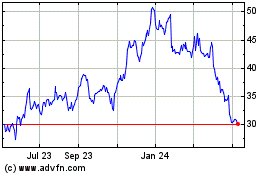Jurors are set to convene on Tuesday to hear opening arguments
in a five-year legal battle that centers on Oracle Corp.'s alleged
role in the decline of one of the former Hewlett-Packard Co.'s most
lucrative products. The lawsuit seeks $3 billion in damages from
the database kingpin.
The trial, in a state court in San Jose, Calif., is one of
several recent skirmishes between Silicon Valley titans. It follows
closely on the heels of a jury verdict last week that found that
Google Inc.'s use of Oracle's Java software didn't violate
copyright law, a ruling Oracle vowed to appeal.
H-P's action against Oracle illustrates how business
partnerships can fray when corporate strategies shift. The trial is
expected to last four to five weeks and could include witnesses
such as Oracle Co-chief Executive Safra Catz and Ann Livermore, a
director of H-P spinoff Hewlett Packard Enterprise Co., which
inherited the litigation.
The case began in 2011, in response to an Oracle news release
that cast doubt on the future of H-P's flagship computers, which
are now sold by HP Enterprise.
The dispute is linked to other bad blood between the companies,
including friction over Oracle's move several years ago to start
selling hardware that competes with H-P's.
H-P, like other makers of server systems, relies mainly on chips
from Intel Corp. to drive its hardware.
But some of the Palo Alto, Calif., company's priciest machines
use an entirely different chip family, dubbed Itanium, than the
variety used in most computers.
In 1994, Intel and H-P developed Itanium in hopes of producing a
broadly used calculating engine to succeed Intel's widely used x86
family. Itanium-based machines proved popular for some jobs where
reliability is paramount, like running stock exchanges. But most
other server makers and their customers found x86 chips more
attractive.
Itanium's lack of traction prompted rivals to come up with the
unflattering moniker "Itanic." International Data Corp. estimated
that annual sales of Itanium-powered systems plunged to $876
million in 2015 from $3.1 billion in 2011.
Matt Eastwood, an analyst at the research firm, said customers
who moved away from Itanium in many cases shifted to H-P x86-based
machines. But those systems don't carry the same generous profit
margins as Itanium-based systems, or the same lucrative contracts
for technical support, he said.
H-P alleged that Oracle, for years an important partner, helped
drive the sales collapse because of its January 2010 purchase of
Sun Microsystems Inc., a deal that turned Oracle into an H-P
competitor.
Oracle denies that allegation, saying that the Itanium-based
products declined for other reasons.
Another conflict between Oracle and H-P emerged in September of
the same year, after Oracle gave a job as co-president to Mark
Hurd, a former chief executive of H-P, whose board had asked him to
resign the month before.
H-P filed suit, arguing that Mr. Hurd possessed trade secrets
that would allow Oracle to compete unfairly with his former
employer. The companies reached a settlement several weeks
later.
In March 2011, Oracle said it would stop creating new versions
of its database and other software for Itanium-based systems.
The company's news release said private conversations with
senior Intel managers made clear that Itanium was nearing the end
of its life. Oracle noted that other software makers had stopped
making new programs targeting the chip technology.
In its response, Intel said it remained committed to Itanium. So
did H-P, many of whose customers used Oracle software to run their
operations. The computer maker sued Oracle in June 2011, saying
that Oracle was obligated by the settlement of the dispute over Mr.
Hurd to keep supporting Itanium as it had been.
"Immediately after issuing its announcement, Oracle exhorted its
salesforce to strike at HP's base of Itanium customers to try to
switch them to Oracle's Sun platform," an H-P trial brief
alleges.
In August 2012, a judge sided with H-P, ruling that the 2010
agreement obligated Oracle to keep developing Itanium versions of
its products free of charge as long as H-P sold such systems.
The new trial, delayed by an Oracle appeal and other factors, is
expected to focus on whether either company violated the agreement
and any damages that might be owed as a result.An Intel spokesman
declined to comment. Intel's last Itanium model was released in
2012. Intel hasn't given a timetable for releasing a successor
version.
Oracle resumed releases of software for Itanium following the
2012 ruling. It contends that, as a result, H-P wasn't harmed and
deserves nothing like the $3 billion in damages it is seeking.
The software company filed a separate claim that H-P illegally
misled customers about the chip technology, which it paid Intel to
keep developing. "H-P desperately sought to hide the demise of
Itanium from its customers and the market in general," Oracle
alleged in a document summarizing its legal position.
Write to Don Clark at don.clark@wsj.com
(END) Dow Jones Newswires
May 30, 2016 20:35 ET (00:35 GMT)
Copyright (c) 2016 Dow Jones & Company, Inc.
Intel (NASDAQ:INTC)
Historical Stock Chart
From Mar 2024 to Apr 2024

Intel (NASDAQ:INTC)
Historical Stock Chart
From Apr 2023 to Apr 2024
